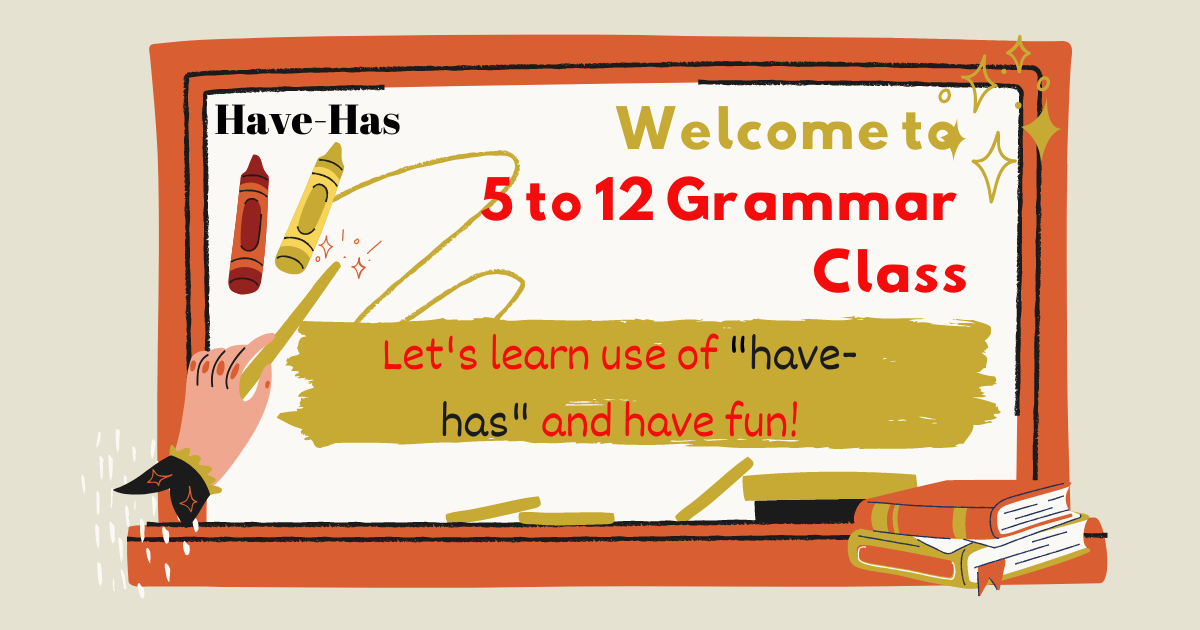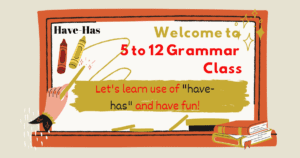In this article we’re going to know how to use do, does as main verb with the help of some sentences.
“have, has” चा वापर काही वेळेस मुख्य क्रियापद म्हणून केला जातो, नकारार्थी व प्रश्नार्थक वाक्यांमध्ये साह्यकारी क्रियापद म्हणून do, does, did, will यांचा वापर करावा लागतो.
भविष्यकाळातील वाक्यांसाठी have किंवा has बरोबर will चा वापर होतो.
Have व has चा वापर रोजच्या इंग्रजी बोलण्यामध्ये कसा करावा याची माहिती आपण या सदरामध्ये घेणार आहोत.
त्याच्यासाठी आपण रोजच्या वापरातील काही वाक्यांचा वापर करणार आहोत व त्याचा सरावही करणार आहोत.
………………………………………………………………………………………………………………………………………………………………
Have चा वापर // Using Have (as main verb)
1. कर्ता प्रथमपुरुषी ( I ) किंवा द्वितीयपुरुषी एकवचनी( you )असेल तर
How to Use “have-has” as Main Verb in Affirmative sentences.
होकारार्थी वाक्य
I + have + object / noun
You + have + object / noun
have — ( कर्त्या )कडे आहे .
will have — ……कडे असेल .
I have four notebooks.
I have a red pen.
I have an idea.
I have a profit.
I will have a permission.
You have a dream.
You have knowledge.
You have good nature.
You will have a computer.
You will have a good job.
………………………………………………………………….
How to Use “have-has” as Main Verb in Negative sentences
I + do not/ did not + have + object / noun
don’t have — …..कडे नाही .
didn’t have — ….कडे नव्हते .
won’t have — ….कडे नसेल.
I don’t have four notebooks.
I don’t have a red pen.
I don’t have an idea.
I don’t have a profit.
I didn’t have a permission.
You didn’t have a dream.
You didn’t have knowledge.
You didn’t have good nature.
You won’t have a computer.
You won’t have a good job.
”””””””””””””””””””””””””””””””””””
How to Use “have-has” as Main Verb in Interrogative sentences/questions
Do I have a red pen?
Do I have an idea?
Do you have a profit?
Will I have a permission?
Did you have a dream?
Did you have knowledge?
Did I have good nature?
Will you have a computer?
Will you have a good job?
,,,,,,,,,,,,,,,,,,,,,,,,,,,,,,,,,,,,,,,,,,,,,,,,,,,,,,,,,,,,,,,
प्रथम, द्वितीय व तृतीय पुरुषी अनेकवचनी कर्त्याबरोबर have चा वापर केला जातो.
How to Use “have-has” as Main Verb in Affirmative sentences
होकारार्थी वाक्य
Plural subject + have + object/ noun
We have four notebooks.
We will have a red pens.
They have an idea.
They will have a profit.
You have a permission.
You have a dream.
We have knowledge.
They have good nature.
You will have a computer.
You have a good job.
……………………………………………………………….
How to Use “have-has” as Main Verb in Negative sentences
नकारार्थी वाक्य
We don’t have four notebooks.
We won’t have a red pens.
They didn’t have an idea.
They don’t have a profit.
You won’t have a permission.
You didn’t have a dream.
We don’t have knowledge.
They won’t have good nature.
You didn’t have a computer.
You don’t have a good job.
”””””””””””””””””””””””””””””””’
How to Use “have-has” as Main Verb in Interrogative sentences / Questions
प्रश्नार्थक वाक्य
Will we have a red pens?
Do they have an idea?
Will they have a profit?
Do you have a permission?
Don’t you have a dream?
Do we have knowledge?
Didn’t they have good nature?
Won’t you have a computer?
Did you have a good job?
”””””””””””””””””””””””””’
Has चा वापर // Use of has
कर्ता एकवचनी तृतीयपुरुषी असेल तर has चा वापर करावा
How to Use “have-has” as Main Verb in Affirmative sentences
होकारार्थी वाक्य
has — ….कडे आहे .
She has a house.
He has stock.
She has many relatives.
Vedant has objection.
Janhavi has skill.
He has success.
…………………………………………………………….
भविष्यकाळात कर्ता एकवचनी तृतीयपुरुषी असेल तर will चा सहाय्यक क्रियापद म्हणून वापर होतो व has ऐवजी have चा वापर होतो.
She will have a house.
He will have stock.
She will have many relatives.
Vedant will have objection.`
Janhavi will have skill.
He will have success.
”””””””””””””””””””’
Has चा वापर असलेल्या वाक्यांचा नकारार्थी किंवा प्रश्नार्थक वाक्यात रूपांतर करताना वर्तमानकाळात does चा सहाय्यक क्रियापद म्हणून वापर होतो व has ऐवजी have चा वापर होतो.
She doesn’t have a house.
Does he have stock?
She doesn’t have any relatives.
Doesn’t Vedant have objection?
Does Janhavi have skill?
He doesn’t have success.
”””””””””””””””””””””””””””””’
Has चा वापर असलेल्या वाक्यांचा नकारार्थी किंवा प्रश्नार्थक वाक्यात रूपांतर करताना भूतकाळात did चा वापर होतो व has ऐवजी have चा वापर होतो.
She didn’t have a house.
Did he have stock?
She didn’t have any relatives.
Didn’t Vedant have objection?
Did Janhavi have skill?
He didn’t have success.
!!!!!!!!!!!!!!!!!!!!!!!!!!
Let’s Practice…. ++++++++++++++++++++++++++++++++
Use have, has and complete the following sentences and learn How to Use “have-has” as Main Verb.
I …… neighbour.
I don’t …… doubt.
You …… freedom.
You don’t …… stability.
They …… problem.
We don’t …… stock.
Does Seeta …… relief?
Vedant …… interest.
Janhavi doesn’t …… account.
He ….. faith.
She …… camera.
Does she …… privacy?
They will …… flat.
We will …… ambition.
He will …… agreement.
!!!!!!!!!!!!!!!!!!!!!!
ही माहिती जेव्हा have व has मुख्य क्रियापद म्हणून वापरले जाते, तेव्हा कोणत्या गोष्टी लक्षात ठेवाव्यात व वाक्यांमध्ये बदल कसे होतात याविषयी आहे…..


